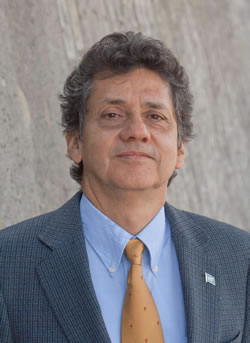Jorge Máttar, Director ILPES:
ILPES Turns 50

Photo: Alejandro Hoppe/ECLAC
At the dawn of the twenty-first century, Latin America and the Caribbean are making efforts to accelerate development. Today, the roles of the State, its institutions, the government apparatus and public policies are being discussed. It is important to mention that the same topics were being raised in the 1950s for moving towards an economic development that would eventually integrate social and environmental sustainability issues.
Created in 1948, ECLAC has supported these efforts through analyses, studies, research, consultancy, and training on development issues. In June 1951, during its fourth session held in Mexico City, ECLAC decided to create the Center for Economic Development Studies. During the session of the ECLAC Committee of the Whole, in February 1952, it was agreed that the Center should take charge of a specialized training programme aimed at a selected group of Latin American economists, with economic development problems – especially research, and elaboration techniques for economic development programmes – as core topics.
The programme had a duration of 10 months and took place in Santiago. At the beginning, it trained an average of 10 fellows per year. Between 1952 and 1959, nearly 100 Latin American economists were trained. By 1959, ECLAC had started to conduct its assistance missions to countries in response to requests sent by governments for more direct assistance regarding staff training within programming bodies, as well as for advice on development issues. At the beginning of the 1960s, the programme expanded to train 35 Latin American economists a year in Santiago, and an average of 40 in other capitals. As demand grew among governments, the foundations for creating an agency exclusively in charge of such a task and with a mandate of its own were laid. Raúl Prebisch, Executive Secretary of ECLAC, was one of the founders of this institution. His accurate analysis on the importance of building and strengthening capacities within governments for the delivery of development programmes was paramount for the creation of ECLAC’s training programme and, later on, for institutionalizing its activities, which resulted in the Latin American Institute for Economic and Social Planning – with the word “Caribbean” added subsequently.
According to Resolution 218 (AC.50) from the eighth session of the ECLAC Committee of the Whole, held in Santiago, Chile, on 16 February 1962, the Institute, sheltered by ECLAC, is to be in charge of providing – upon governments’ request – training and advice to countries and territories within the geographical scope of the Commission, as well as guiding research on planning techniques.
On 2 July 1962, ILPES was officially launched through the opening of a training course on Economic Development in Santiago – which can be understood as an extension of the training programme having been offered by ECLAC since a decade earlier. Raúl Prebisch became the first Director of ILPES. Since that moment, in the same spirit as back in 1962, the Institute has worked steadily and provided governments with support for institutional and human capacity building. Thousands of students who sat the lecture halls at ILPES hold now senior posts in governments and other agencies.
Present and future
The world and the region have certainly changed in these last five decades. Latin America and the Caribbean have moved forward regarding development. Yet, there are pending issues and new challenges that require the expertise of ILPES in order to respond to emerging demands. Countries are analyzing the results achieved through the development structure used in the past two decades, as well as the formula for reducing inequality. They are also discussing on what seems to be a renewed interest in planning and development policies focusing on equality goals as a result of discussions on the role of the State.
State’s policies must be designed for the long-term. Today, countries are paying more and more attention to developing future scenarios where reducing inequality is a generalized aim. Thus, planning is a powerful instrument capable of articulating interests from different stakeholders (State, society, governments, the world), different levels (national and local) through public policies (from the State; national and sub-national plans and programmes) in the long term (sustainability).
ILPES cooperates and discusses with countries on this new approach to planning which responds to national development agendas, and that – opposite to mechanisms in the past – builds on growing participation – a result of democratic development experienced by countries in the region.
The Institute has documented processes in the region on topics such as public management, and especially on public finances. Public deficit and debt burden have decreased, and management, accountability and public information systems have improved. Nevertheless, there are still some challenges such as a low tax burden, as well as a structure causing that income and outcome are at best slightly progressive, yet normally regressive. Therefore, a new fiscal covenant is necessary.
At a sub-national level, we noticed there is a growing concern among governments due to disparities between regions, which increase inequalities and hinder convergence.
To sum up, national development strategies, long-term futures scenarios, a new fiscal covenant and territorial development are core issues in the work of ILPES, as they respond to countries’ demands and are critical interveners on the path traced by the ECLAC paper Time for equality: closing gaps, opening trails.
Today, ILPES portrays itself as a regional entity for excellence in generating and disseminating knowledge, and elaborating proposals on the role of the State in development processes, as well as in the improvement of planning and public management, while it simultaneously approaches its own issues and regional needs. This is our main goal at the Institute, which we are honored to belong.
|
|
|
| Planning is a powerful instrument capable of articulating interests from several actors and levels by means of public policies in the long term. | |
|
|
|
| The Latin American and Caribbean Institute for Economic and Social Planning (ILPES) has been facilitating capacity development in the region for five decades. | |